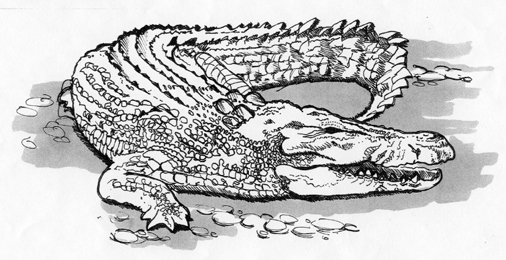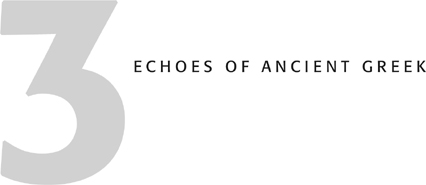The Greek alphabet often shows up in our maths and sciences: beta blockers are a class of medications, gamma rays are a kind of electromagnetic radiation, and pi (π, the Greek letter p) is a ratio used in math involving circles. The leaders of an animal pack are the alpha female and alpha male. A triangular airplane wing, or the triangle of a spreading river-mouth, is a delta, after the capital Greek D, ∆. (You can find the whole Greek alphabet in “More about Greek,” at the end of this book.)
Iota was the name of the Greek i, the smallest letter in their alphabet. In English an iota is the smallest possible amount (“She hasn’t got an iota of talent!”) Our word jot comes from iota, and means the same thing. And when we “jot down a note,” we are writing as little as possible.
We borrow Greek words to create all kinds of new meanings. The Greek for circle, kuklos, shows up in bicycle, cyclone (a circular storm), and recycling (using over and over). From naus, ship, we get nautical (related to ships and sailing), navigable (passable by ships – “Is that river navigable?”), and astronaut (“star-sailor”). From hudor (water) come dehydrated (deprived of water), hydraulic (powered by water), and hydroponics (growing plants in water without soil). Knowing a little Greek can help you figure out a lot of English words, even if you’ve never seen them before.
The Greeks had two versions of the letter o. One was omicron (o), or o-little (as in “microscope,” for seeing little things). The other was omega (Ω), or o-big (as in “megacity,” big city). Since omega was the last letter of the Greek alphabet, “My dog knows every trick from alpha to omega” means Rover knows all the tricks from A to Z - in other words, absolutely everything.

In Ancient Greece, male athletes practiced their exercises naked (gumnos). We still call a room for athletics a gymnasium.
The Greek alphabet may have been simple, but the language certainly wasn’t. It was highly “inflected” – that is, words changed depending on how they were used. A noun could have many forms, because if you wrote “This crocodile stole the fish from that crocodile and gave it to another crocodile,” the ending on “crocodile” was different each time, depending on what role that particular crocodile played in the action. If you said “These crocodiles” you needed a whole different set of endings, for the plural. And if you talked about one lion (leon) or two lions instead of one or two crocodiles, you needed two more sets of endings, because words ending in os (like krokodilos) didn’t have the same endings as words ending in on (like leon) – in the singular, or in the plural!

In Ancient Greek, kroke means “stones” and drilos means “worm” — so a worm-shaped animal that liked to sunbathe on stony shores was called a krokodilos. (photo credits 3.1)
And that’s only the beginning. All nouns also had gender. Grasshopper was masculine but flea was feminine. Soup was masculine but dessert was neuter (neither masculine nor feminine). So if you described some animal as large (megas), the ending on megas depended on how many animals you meant, and whether they were masculine or feminine or neuter, and what role they played in the action!
And verbs were no easier. We say come and coming and came, and we add a few auxiliary verbs (such as was, will, or had). A Greek verb could have as many as two hundred different forms, depending on the tense (past, present, future, etc.), the voice (active or passive), how many people were involved, and so on.
How did schoolkids ever learn all those endings? Memorize, memorize, memorize!

Euphemisms (from Greek eu pheme, “fine-speaking”) are polite ways of not saying what we really mean — and we work them overtime when it comes to certain bodily functions. Our word “toilet” is from French toilette, dressing room. The Romans went to the necessarium; we go to the washroom, but not just to wash; to the bathroom, but not to bathe; to the powder room, but not to powder anything! We go to the ladies’ and gents’, the little room, the bog (wet like a swamp), the privy (private place), the john. In England we pop out to the WC (water closet), lavatory (from French laver, to wash,) or loo (perhaps from French l’eau, “water,” or lieu, “place”). And if we need to “spend a penny,” we’re recalling the days when many public toilets in England were behind a one-penny turnstile.
